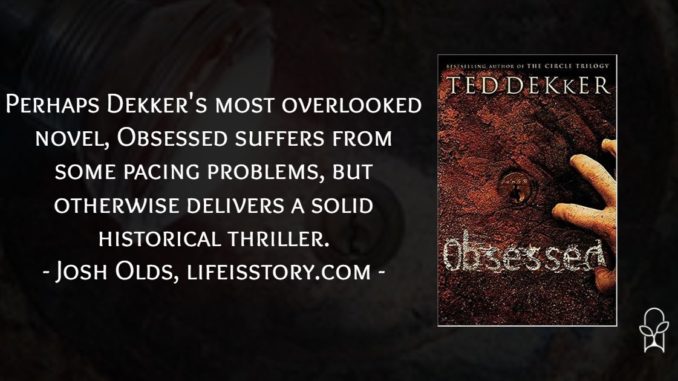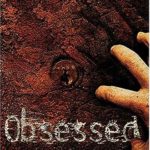
Also by this author: The Promise, The Drummer Boy, Sinner, Green, The Dream Traveler's Quest, Into the Book of Light, The Curse of Shadownman, The Garden and the Serpent, The Final Judgment, Millie Maven and the Bronze Medallion
Published by Thomas Nelson on February 10, 2005
Genres: Fiction, Christian, Historical, Suspense, Thriller
Buy on Amazon
Goodreads

Stephen Friedman is making a good living in good times. He's just an ordinary guy. Or so he thinks.
But one day an extraordinary piece of information tells him differently. It's a clue from the grave of a Holocaust survivor. A clue that makes him heir to an incredible fortune . . . a clue that only he and one other man can possibly understand.
That man is Roth Braun, a serial killer who has been waiting for Stephen for thirty years. Roth was stopped once before. This time nothing will get in his way.
Known worldwide for page-turning, adrenaline-laced thrillers, Dekker raises the stakes in this story of passion, revenge, and an all-consuming obsession for the ultimate treasure.
Obsessed may be Ted Dekker’s most overlooked novel. Coming just a few months after the conclusion of the Circle Trilogy, Obsessed was a return to the “old Dekker,” suspense thrillers with a theme taken directly from Scripture. Specifically, Dekker’s theme was the same as two short parables told by Jesus”
“The kingdom of heaven is like treasure hidden in a field. When a man found it, he hid it again, and then in his joy went and sold all he had and bought that field. Again, the kingdom of heaven is like a merchant looking for fine pearls. When he found one of great value, he went away and sold everything he had and bought it.” (Matthew 13:44-46)
Heaven’s Wager was a form of retelling the Job story. When Heaven Weeps is a Hosea story. Thr3e followed the conflict of the old and new natures as explained by Paul in Romans 7. Blink explored the nature of God’s knowledge and the power of prayer. Nearly every one of Dekker’s early novels focused on a theological theme or portion of Scripture and wrote out of that a novel that explored those general themes. After the success of the Circle Trilogy, sort of the ultimate example of this thematic style of writing, Dekker moved toward other thematic sources. So, in a way, Obsessed represents the end of Dekker’s early years and transitions into his prime “Christian Fiction” years.
Obsessed is the story of Stephen and his singular goal of finding the mother he never knew. It’s the story of Roth Braun and his desire to finish his father’s murderous work. It’s the story of Ruth and Martha’s quest to survive the Nazi concentration camp and give their babies a better life. It’s the story of Gerhard Braun and his lust for power and control. Every character in Obsessed has an obsession and Dekker plays the characters off each other—good and evil, father and son, mother and children—letting readers compare and contrast, drawing thematic parallels.
Historical fiction is relatively new to Dekker (though one might be able to categorize When Heaven Weeps in that genre). The story flips between the 1940s in the final days of World War 2 and the 1970s where a young Jewish Holocaust survivor discovers an unexpected link to his past. Holocaust stories are difficult to write. First, because they have been done so well. Second, because it is so important to frame those events correctly and not simply use them as a device to bring suspense and horror to the story.
Dekker navigates the historical aspect well, though his focus on the historical aspect is to set the context for his fictional narrative. That is, Dekker is not writing a Holocaust novel, but a novel in which the Holocaust serves as the setting and context. Wisely, Dekker avoids the more popularly known concentration camps, setting the story in Torun, Poland, at Stutthof. In history, this was the first camp set up outside of Germany and the last to be liberated by the Allies. As fiction, Dekker does not use any real-life individuals who controlled the camps and instead installs Gerhard Braun as the camp’s leader. Even the “present” storyline takes place about forty years before the book is written. Here, Dekker plays a little more loosely with the historical aspect. Other than some highly-stereotypical hippies, Obsessed never feels like it is set in the 1970s.
The story revolves around Stephen discovering a link to his past contained in a home that’s just been purchased by Roth Braun. Roth and Stephen are both looking for the same thing: The Stones of David. Allegedly, these five stones are the stones picked up by David in the killing of Goliath. Gerhard Braun possessed those stones, but had them taken by Stephen’s mother in her escape from the camp. This is almost an unnecessary storyline, as the stones play little to no role in the plot. Dekker simply needed some thing for both men to be obsessed over. And actually, the obsession—for Stephen—soon becomes the lost daughter of his mother’s best friend in the camp.
With so many passionate pursuits going on, Dekker unfortunately chooses to focus primarily on the most boring: getting into the basement of the house. Why is Braun not actively searching the house? Why does he have the most stereotypical flunkies ever guarding the house? I don’t know. The pacing picks up in the third act to focus on what it should have been focusing on the whole time.
Obsessed would have been a better novel if it had kept the main thing the main thing. Ruth and Martha’s story is written to perfection and how that story finds resolution in the “present” of the 1970s is deeply satisfying. Stephen’s storyline is a bit more haphazard. Too much time is spent on the boring parts (meaning “boring” as both uninteresting and “boring” as in drilling a hole) that ultimately go nowhere, which then forces the good parts to be too superficial and fast-paced to really draw out the depth it deserved.
That said, I think a lot of people have forgotten about Obsessed because it came out sandwiched between The Circle Trilogy and The Paradise Trilogy at a time when Dekker was publishing several novels a year. It did get picked up for rerelease in 2015 with Center Street and maybe a few people found it from that, but whenever I talk to people about Ted’s work, this tends to be one that got left off the radar.

